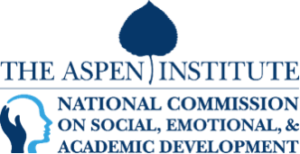Commissioners To Learn How City’s Schools Embrace Social and Emotional Learning
Contact:
Melissa Mellor
The Aspen Institute
Melissa.Mellor@AspenInstitute.org | (202) 736-3552

CLEVELAND — April 19, 2017 — The Aspen Institute’s National Commission on Social, Emotional, and Academic Development will host its first site visits and public meetings May 1-2 in Cleveland. The 25-member Commission will meet with educators, parents, students, and policymakers to learn how Cleveland is integrating social and emotional learning across schools and programs.
The Cleveland Metropolitan School District (CMSD) has won national attention for its Humanware initiative, which helps students manage their emotions so they are better able to work with peers and succeed in and outside of school. CMSD launched Humanware following a school shooting a decade ago to reframe its curriculum, student services, and teacher professional development. Cleveland students participate in school climate surveys and advisory committees that share feedback with school and district leaders. They also benefit from school-based student support teams, constructive alternatives to in-school suspension, and opportunities to build self-reflection and conflict resolution skills.
“The Commission believes that the success of young people in school and beyond is inextricably linked to healthy social and emotional development. Cleveland has pioneered this philosophy and is seeing promising results,” said Shirley Brandman, executive director of the Commission. “We look forward to learning more about Cleveland’s challenges, lessons, and ongoing work.”
The Commission is engaging communities nationwide about the need to make social, emotional, and academic development part of the fabric of K-12 education so that all students reach their potential. The Commission will share the promising practices and innovative policies learned from these exchanges in its Report From the Nation due in late 2018.
“Students with social and emotional competence exhibit high levels of achievement and will be successful in school and in life,” explained Eric Gordon, CMSD’s chief executive officer, noting the district’s graduation rate has increased by 17 percentage points since 2010-11 and public confidence in CMSD is growing. “Our school community is so committed to this belief and approach to learning that we include it in our contract agreement with teachers so that it survives administrative changes.”
A Learning Opportunity
Commissioners will begin the first day of their meeting with visits to Wade Park Elementary School, a pre-K-8 school, and Facing History New Tech High School. Both schools exemplify CMSD’s commitment to support the social, emotional, and academic development of all students.
“The Commissioners are eager to see on-the-ground examples of social, emotional, and academic development, and one of our priorities will be to learn how educators design environments that intentionally support the whole child,” said Brandman. “We’ll also be asking educators to reflect on what changes in policy and practice are necessary for scaling this work and making it sustainable.”
Later in the day, Commissioners will hear from Gordon and District of Columbia Public Schools Chancellor Antwan Wilson. Participation in the May 1 activities is by invitation only.
The May 2 field hearing will take place at the Cleveland Public Library and will be open to the public. The day will begin with a panel conversation from 9-10:30 a.m. on the role of state and local leadership in supporting social, emotional, and academic development. The panelists are:
- Paolo DeMaria, Ohio state superintendent of public instruction;
- Senator Peggy Lehner, chairperson of the Ohio State Senate Education Committee; and
- Robert Heard, vice chair of the CMSD board of education.
A second panel conversation with Commissioners will feature partners from the greater Cleveland community that have come together in support of the district’s work. “We are excited for the Commission to hear from our partners about the roles they have played to help us build awareness and strengthen buy-in for our approach to social and emotional learning,” said Gordon.
Fulfilling a Mission
The Commission, launched last fall, is led by co-chairs Linda Darling Hammond, president and chief executive officer of the Learning Policy Institute; Governor John Engler, past president of the Business Roundtable and former Michigan governor; and Tim Shriver, co-founder and chair of the Collaborative for Academic, Social, and Emotional Learning and chairman of the Special Olympics. The Commission includes sitting governors of both parties (Terry McAuliffe, D-VA, the current chair of the National Governors Association (NGA); and Brian Sandoval, R-NV, the incoming chair of NGA), superintendents, teachers, parents, and business representatives.
The Commission will meet over the next 18 months and convene smaller groups of diverse stakeholders, including committees of students, parents, educators, scholars, funders, and partner organizations from all parts of the country and different political philosophies to develop recommendations.
Near the end of 2018, the Commission’s work will culminate with a Report From the Nation, which will set out a roadmap for implementation of social, emotional, and academic development approaches at state, district, and local levels.
About the National Commission on Social, Emotional, and Academic Development
The National Commission is engaging and energizing communities to fully integrate social, emotional, and academic development in K-12 education so that all students are prepared to thrive in school, career, and life. To learn more, visit www.AspenSEAD.org and follow the Commission on Twitter at @AspenSEAD.
About the Aspen Institute
The Aspen Institute is a nonpartisan forum for values-based leadership and the exchange of ideas. The Institute is based in Washington, DC and has campuses in Aspen, Colorado and on the Wye River on Maryland’s Eastern Shore. It also has offices in New York City and an international network of partners. For more information, visit www.aspeninstitute.org.